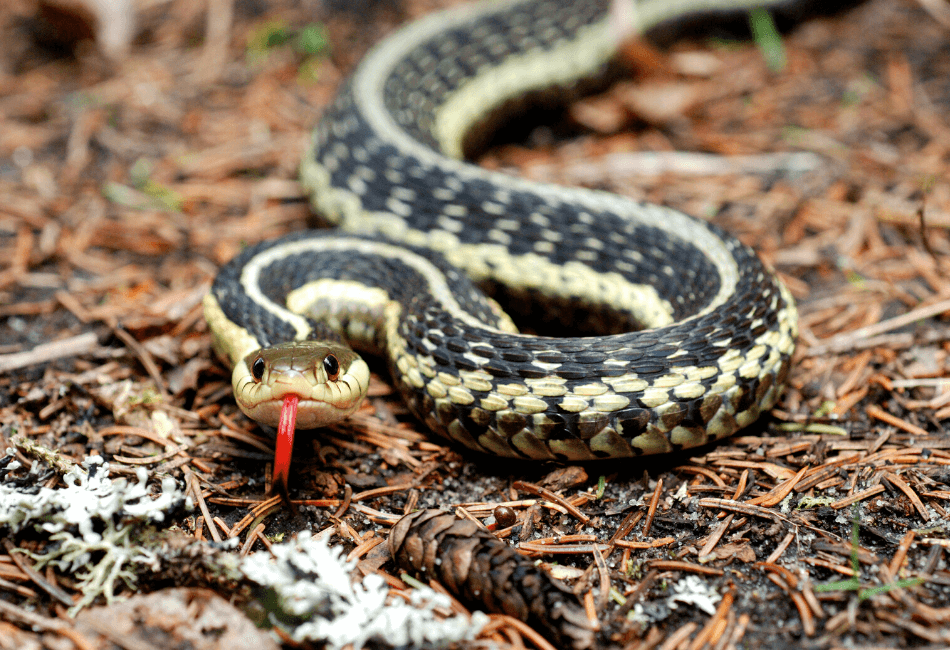Generally, mulch is considered beneficial to a yard. Its primary benefits include an increase in curb appeal, weed prevention, moderation of soil-temperature, and the ability to allow the soil to retain moisture for a longer period.
Despite its benefits, there are some downsides to using mulch. Mulch provides a convenient resting place for pests. This includes snakes who may burrow under it for shelter and can even wait out the winter in it. Snakes may also look for food such as worms or frogs in mulch for an easy snack.
The video below shows a visual of snakes hiding in mulch. Snakes do not need nearly as much mulch to hide as is shown in the video. The typical 2 to 4 inch layer that most people have piled in their landscaping beds is enough room for many types of snakes to feel comfortable enough to stick around.
You can consider using lava rock instead of wood or a similar softer mulch. The University of Nebraska-Lincoln states that lava rock has sharp edges that snakes do not like to lay on. They advise to use fresh lava rock for the best results.
Table of Contents
Deterring Snakes from the Yard
A few common sense tactics can go a long way in keeping snakes out of the yard. Here are a few tips to help reduce the chances of snakes lingering outside the home:
Keep the lawn mowed – You do not need to mow the lawn down to putting green height, but it should be cut to the recommended healthy height for your grass type. Mowing should be completed when no more than one-third of the grass blades can be removed to get the lawn back to its ideal height. The purpose of keeping up on mowing is so that snakes will be less likely to move through the grass since they will be exposed to potential predators.
Eliminate Outdoor Animal Food – Things like dog food and bird seed can attract rodents and other pest that snakes feed on. If you attract the food sources of snakes, you can increase the chances for snakes in the yard.
Collect Fruits & Berries – According to Victor, fruits and berries are a favorite of rodents. If you have fruits and berries dropping to the ground and sitting for some time in the yard, you may consider picking them up sooner. The fruits and berries can attract rodents. If your yard has rodents, you may increase your odds for snakes.
Clean Up Trash – Most of us don’t have trash scattered through the yard, but many people have easily accessible open trash cans that can attract rodents. Be sure to tightly seal the trash can lids to avoid snakes.
Minimize Watering – Watering the lawn, flowers, and garden often cannot be avoided. However, if snakes are a problem, reducing watering can decrease snake food sources such as frogs and worms.
Remove Firewood Piles – Just like mulch, firewood or other types of wood provide an excellent place for snakes to hide. You should consider eliminating wood piles or placing them in a location where snakes will not be a significant issue if they happen to use the pile for shelter.
Clean up the vegetation – Plants and shrubs that are growing out of control often provide excellent cover for snakes. By trimming up trees and shrubs, you can eliminate spots for snakes to take cover.
Avoid repellents – Most repellents do a horrible job at driving off snakes. This includes mothballs that are intended for, well, moths. However, many people still believe mothballs work to repel snakes and other similar pest. Read our article on mothballs as a snake repellent for more information.
Final Thoughts
Mulch should be considered a potential hiding place for snakes in any yard where there are snakes locally. This is especially true for areas that have poisonous snakes where it may be easy to unknowingly come in close contact with one while gardening or doing another activity while in the mulch. By routinely looking for ways to deter snakes, you will help reduce the odds of finding one in the mulch. Be sure to call a pest control professional if you have doubts on being able to safely take care of a snake problem.

